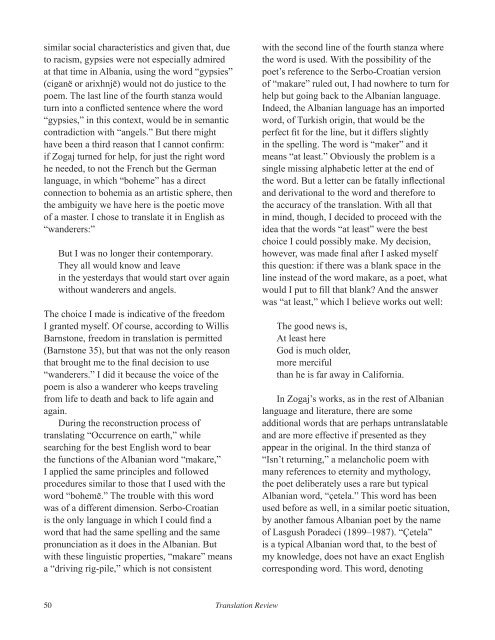Table of contents - The University of Texas at Dallas
Table of contents - The University of Texas at Dallas
Table of contents - The University of Texas at Dallas
You also want an ePaper? Increase the reach of your titles
YUMPU automatically turns print PDFs into web optimized ePapers that Google loves.
similar social characteristics and given th<strong>at</strong>, due<br />
to racism, gypsies were not especially admired<br />
<strong>at</strong> th<strong>at</strong> time in Albania, using the word “gypsies”<br />
(ciganë or arixhnjë) would not do justice to the<br />
poem. <strong>The</strong> last line <strong>of</strong> the fourth stanza would<br />
turn into a conflicted sentence where the word<br />
“gypsies,” in this context, would be in semantic<br />
contradiction with “angels.” But there might<br />
have been a third reason th<strong>at</strong> I cannot confirm:<br />
if Zogaj turned for help, for just the right word<br />
he needed, to not the French but the German<br />
language, in which “boheme” has a direct<br />
connection to bohemia as an artistic sphere, then<br />
the ambiguity we have here is the poetic move<br />
<strong>of</strong> a master. I chose to transl<strong>at</strong>e it in English as<br />
“wanderers:”<br />
But I was no longer their contemporary.<br />
<strong>The</strong>y all would know and leave<br />
in the yesterdays th<strong>at</strong> would start over again<br />
without wanderers and angels.<br />
<strong>The</strong> choice I made is indic<strong>at</strong>ive <strong>of</strong> the freedom<br />
I granted myself. Of course, according to Willis<br />
Barnstone, freedom in transl<strong>at</strong>ion is permitted<br />
(Barnstone 35), but th<strong>at</strong> was not the only reason<br />
th<strong>at</strong> brought me to the final decision to use<br />
“wanderers.” I did it because the voice <strong>of</strong> the<br />
poem is also a wanderer who keeps traveling<br />
from life to de<strong>at</strong>h and back to life again and<br />
again.<br />
During the reconstruction process <strong>of</strong><br />
transl<strong>at</strong>ing “Occurrence on earth,” while<br />
searching for the best English word to bear<br />
the functions <strong>of</strong> the Albanian word “makare,”<br />
I applied the same principles and followed<br />
procedures similar to those th<strong>at</strong> I used with the<br />
word “bohemë.” <strong>The</strong> trouble with this word<br />
was <strong>of</strong> a different dimension. Serbo-Cro<strong>at</strong>ian<br />
is the only language in which I could find a<br />
word th<strong>at</strong> had the same spelling and the same<br />
pronunci<strong>at</strong>ion as it does in the Albanian. But<br />
with these linguistic properties, “makare” means<br />
a “driving rig-pile,” which is not consistent<br />
with the second line <strong>of</strong> the fourth stanza where<br />
the word is used. With the possibility <strong>of</strong> the<br />
poet’s reference to the Serbo-Cro<strong>at</strong>ian version<br />
<strong>of</strong> “makare” ruled out, I had nowhere to turn for<br />
help but going back to the Albanian language.<br />
Indeed, the Albanian language has an imported<br />
word, <strong>of</strong> Turkish origin, th<strong>at</strong> would be the<br />
perfect fit for the line, but it differs slightly<br />
in the spelling. <strong>The</strong> word is “maker” and it<br />
means “<strong>at</strong> least.” Obviously the problem is a<br />
single missing alphabetic letter <strong>at</strong> the end <strong>of</strong><br />
the word. But a letter can be f<strong>at</strong>ally inflectional<br />
and deriv<strong>at</strong>ional to the word and therefore to<br />
the accuracy <strong>of</strong> the transl<strong>at</strong>ion. With all th<strong>at</strong><br />
in mind, though, I decided to proceed with the<br />
idea th<strong>at</strong> the words “<strong>at</strong> least” were the best<br />
choice I could possibly make. My decision,<br />
however, was made final after I asked myself<br />
this question: if there was a blank space in the<br />
line instead <strong>of</strong> the word makare, as a poet, wh<strong>at</strong><br />
would I put to fill th<strong>at</strong> blank And the answer<br />
was “<strong>at</strong> least,” which I believe works out well:<br />
<strong>The</strong> good news is,<br />
At least here<br />
God is much older,<br />
more merciful<br />
than he is far away in California.<br />
In Zogaj’s works, as in the rest <strong>of</strong> Albanian<br />
language and liter<strong>at</strong>ure, there are some<br />
additional words th<strong>at</strong> are perhaps untransl<strong>at</strong>able<br />
and are more effective if presented as they<br />
appear in the original. In the third stanza <strong>of</strong><br />
“Isn’t returning,” a melancholic poem with<br />
many references to eternity and mythology,<br />
the poet deliber<strong>at</strong>ely uses a rare but typical<br />
Albanian word, “çetela.” This word has been<br />
used before as well, in a similar poetic situ<strong>at</strong>ion,<br />
by another famous Albanian poet by the name<br />
<strong>of</strong> Lasgush Poradeci (1899–1987). “Çetela”<br />
is a typical Albanian word th<strong>at</strong>, to the best <strong>of</strong><br />
my knowledge, does not have an exact English<br />
corresponding word. This word, denoting<br />
50 Transl<strong>at</strong>ion Review

















